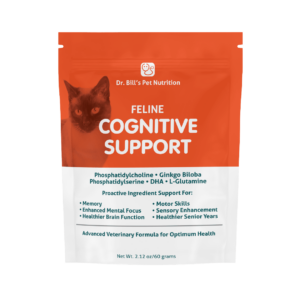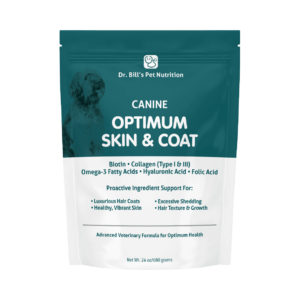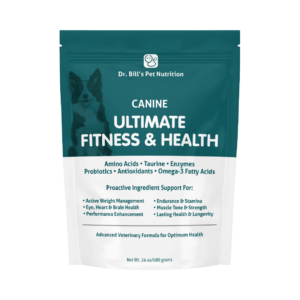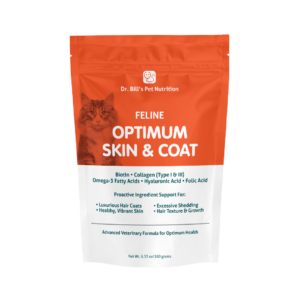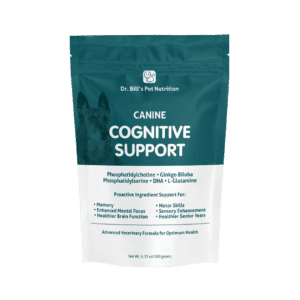
Phosphatidylcholine
Phosphatidylcholine (PC) plays an essential role in the overall health of all dogs and cats. Their cell membranes are primarily made up of phospholipids, the most abundant one being Phosphatidylcholine (PC). Typical food sources of PC include egg yolks, soy lecithin, red meats, sunflower seeds, liver and spinach. Very little PC is found in typical pet food offerings thus making supplementation quite beneficial. PC is the precursor of sphingomyelin an important component in the myelin sheath of every nerve cell and also provides needed Choline for the production of the neurotransmitter acetylcholine. Primary benefits of PC supplementation include enhancing memory, improving brain function, slowing cognitive decline and has also been used to protect the liver from the accumulation of fat and cholesterol. The normal dosage of PC for the dog and cat ranges between 0.5 & 1.0 mg/Lb. Dr. Bill’s Canine Cognitive Support provides 49.10 mg/scoop or 1.47 mg/Lb. while Dr. Bill’s Feline Cognitive Support provides 12.37 mg/scoop or 1.54 mg/Lb.
Phosphatidylcholine is an integral component of almost every cell in the animal body and has been proven safe and effective over decades of study as a therapeutic agent.
Functions of Phosphatidylcholine:
• Phosphatidylcholine is a phospholipid that is a major constituent of cell membranes and is important for normal cellular membrane composition and repair
• PPC is the major supplier of the essential nutrient choline, which is the precursor of the neurotransmitter acetylcholine, the methyl donor betain and sphingomyelin
• PPC’s role in cell-membrane integrity is vital to all basic biological processes such as:
o Information flow within cells from DNA to RNA to proteins
o The formation of cellular energy and intercellular communication or signal transduction
• PPC maintains fluid levels within membranes. A decrease in fluid membrane levels can result in a breakdown of cell-membrane integrity as well as impairment of cell-membrane repair mechanisms, which is associated with disorders including liver disease, neurological disease, various cancers and cell death
Phosphatidylcholine has been shown to play a vital role in many important areas including maintaining cell structure, fat metabolism, memory, nerve signaling, as a precursor to important neurotransmitters, and liver health.
Of the thousands of molecules that make up a living cell, Phosphatidylcholine is one of the most fundamental and important. A vital component of the cell membrane, it is the most abundant in a class of phospholipids known as “essential phospholipids”, as it forms the structural skin that surrounds the cell.
Phosphatidylcholine is often referred to as the “Miracle Molecule” and its importance in anti-aging continues to be explored in both man and animal.
Phosphatidylcholine Benefits
• Skin Health
• Fat Metabolism
• Liver Health
• Weight Loss
• Improved Memory
• Intestinal Health
• Neuropsychiatric Disorders
The role of Phosphatidylcholine in Aging
Normally found in very high concentrations in newborns, particularly in brain tissue, PPC levels decline over time. The typical animal diet is more than likely deficient in PPC as phospholipids are not part of the essential nutrient guidelines provide to pet food manufacturers. By supplementing with Phosphatidylcholine we can increase the levels in our pet’s cells and effectively halt or potentially reverse age-related cognitive decline and other diseases associated with advanced aging.
Many studies have found Phosphatidylcholine supplements can improve learning, aid memory, help promote skin elasticity, and even support optimal liver function.
NEW
Subscribe & Save
Save 10% On Auto Deliveries
Shop Now
